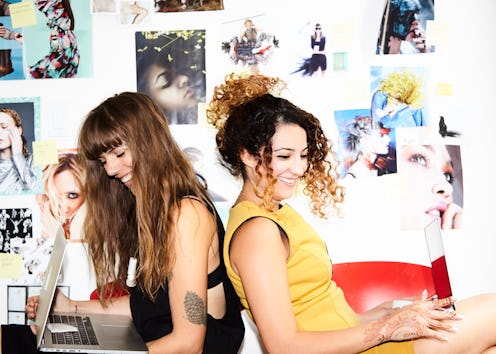Life
The One Thing I Did In My 20s That I'm Leaving Behind In My 30s

I am coming up to my 30s, and there are many things I'm refusing to leave behind: glittery eyeshadow, for instance, or dyeing my hair blue (which has been My Thing for 14 years). However, there's one aspect of my frankly not-misspent-enough twenties that I'm keen to leave behind: Comparing myself to others has been toxic for me since I was small. And I am very ready to heave the mental habit over the side of the boat and watch it sink to the bottom as I turn 30.
Social comparison, as the concept is known in psychological circles, is not an uncommon problem, and its damages are well-known to experts. Dr. Adam Gonzalez, a psychiatrist at Stony Brook Medicine, tells Bustle, "Social comparisons can help motivate us to achieve more and strive to be better, and they can make us feel good about our current self and current life situation." Studies have repeatedly indicated that comparing oneself to others, and basing self-worth and ideas of self-love on those judgements, is heavily linked to depressive feelings. This is particularly the case in the age of social media, where curated snapshots of other peoples' lives both stimulate our voyeuristic impulses and make us feel inferior. For some people, healthy competitive comparison simply fuels their ambition. But for me, it has only ever been unhealthy.
A bit of background: I was a "bright kid" who skipped grades, went to college at 16, and got my PhD at 26. A lot of people in these circumstances experience the crush of discovering they're not always the brightest bulb in the room when they hit adulthood. But I had another issue: I had swallowed the idea, somewhere in my youth, that the only way in which I could prove myself worthy of love and acceptance was through achievement. My childhood was tumultuous, and an A+ meant that I could be assured of security and stability. Anything less, and the bottom fell out of the world.
"Social comparisons," Dr. Gonzalez tells Bustle, "can turn harmful when we start drumming up many high expectations and make negative conclusions about our self and abilities ('I can never achieve that... I am a failure'). These negative thoughts and beliefs can lead to a downward spiral in how we feel and what we do or do not do."
After I got my PhD, I entered into an artistic field — which, if you're wondering, did not make this better. A friend wrote to me recently that in deciding to become a novelist and librettist, I'd entered a field where failure and comparison are constants, where even the best experience knock-backs and poor reviews, and where good grades matter for precisely nada. It's easy to compare yourself to the person who got published at 22, or the one that got a Booker nomination at 25, while you, meanwhile, have not.
Therapy has been instrumental in helping unlearn this behavior, and if this cycle sounds familiar to you, it's OK to seek help. My therapist has taught me to center my feelings of real delight when friends do great things, and to understanding that my comparison problem does not come from a healthy place of natural envy, but from traumatic damage that needs healing. I have been working to understand the many areas of life where I have value outside of achievement: as a friend, as a partner, as a sister, as a person. "Even if you never get a book published in your life, I'll love you," my husband says, as if it's obvious, and I cry and almost believe him.
Dr. Gonzalez notes that there is hope for toxic comparers. "First," he tells Bustle, "work on appreciating and loving yourself where you are at right now. This first step can help lift some mental weight off of you and free up space in your mind to think about next steps for change. Next, you can think about what is important for you, what do you value most and steps you can take to start achieving it. It is important to set realistic, small goals. And remember to keep coming back to self-acceptance, appreciation and love."
In my thirties, I'm working to give up on looking sideways and ranking myself against others. Everybody has their own issues, their own luck, and their own journey. There is room in the world for all of it, and those who streak ahead don't negate all the rest of the work we're yet to do. Here's to an end to toxic comparison, and the beginnings of feeling my real person-value.